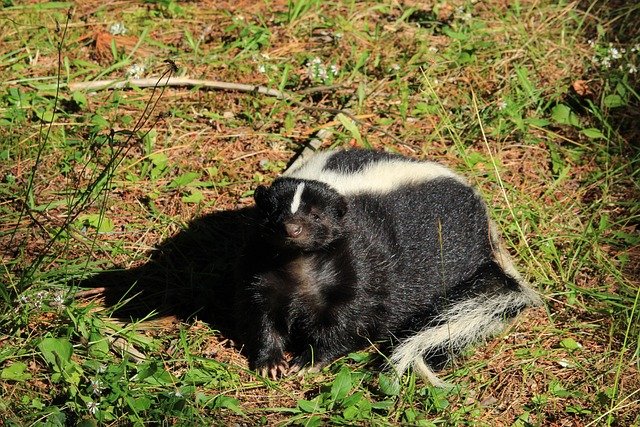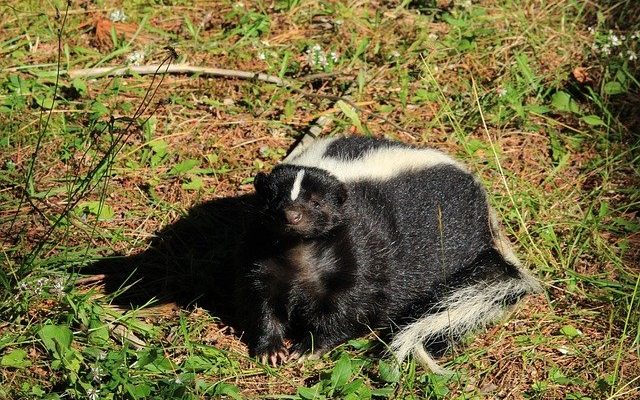
Just like humans find various ways to cope with harsh weather—think about how we bundle up in layers for winter or hydrate in the summer—skunks have their own unique tricks up their furry little sleeves. You might be surprised at how resourceful these critters really are. Let’s dive into the world of skunks and discover how they manage to survive where conditions are far from cozy.
1. Habitat Choices: Finding the Perfect Home
Skunks are a bit of homebodies. They prefer to live in environments that provide shelter and access to food. They’re often found in areas like forests, grasslands, and even urban neighborhoods. Why? Because these spots offer protection from predators and harsh weather. Skunks thrive in diverse habitats, adapting to whatever’s available.
In some cases, they dig their own burrows or take over abandoned holes from other animals. Think of it as finding an apartment that fits your budget. They’re not picky but understand what’s essential for their survival. And when things get tough, skunks may even hibernate or go into a deep sleep during particularly cold months. This behavior helps them conserve energy and avoid the worst of the cold.
Urban Adaptation
You might be wondering how skunks handle city life. Surprisingly well! Urban skunks have adapted to human environments, where food is often plentiful. They rummage through trash cans and find leftovers that would make a decent meal. However, living near people isn’t without its challenges. They have to be cautious of pets, cars, and other urban dangers. Still, they find ways to navigate these obstacles, showcasing their cleverness.
2. Diet: A Versatile Menu
Skunks are omnivores, which means they eat a variety of foods. This diet is key to their survival. They munch on insects, fruits, nuts, and small mammals. This flexibility allows skunks to thrive in different environments, where food sources can vary wildly. If one meal option runs low, they can easily switch to another.
For example, in the spring and summer, skunks might feast on insects like beetles and crickets. But as colder weather sets in, they might turn to nuts and fruits that they can find or even cache for later. They’re like savvy diners who know how to make the best out of whatever’s on the menu.
Seasonal Feeding Habits
Each season brings different food opportunities. During the fall, skunks get busy foraging to build up fat reserves for winter hibernation. Imagine them as little squirrels, gathering their snacks! This seasonal planning is crucial for making it through harsh winters when food becomes scarce. It’s all about being smart and prepared.
3. Physical Adaptations: Nature’s Armor
Skunks aren’t just about their famous scent. They have physical adaptations that help them thrive in tough conditions. Their thick fur serves as insulation, keeping them warm during freezing temperatures. And when it gets too hot, skunks can often be found burrowing into the cooler soil to escape the heat—like finding a nice shady spot at the beach.
Their claws are built for digging, allowing them to create burrows and search for food underground. This ability makes them resourceful and resilient. Plus, their excellent sense of smell helps them find food and detect danger, making them aware of their surroundings.
The Defense Mechanism
Of course, we can’t forget their most notable feature: the infamous spray. When threatened, skunks will raise their tails and spray a foul-smelling liquid at potential predators. This scent is a last resort, but it’s effective—most animals think twice before approaching a skunk! It’s a clever survival strategy that allows them to fend off threats without having to run away.
4. Social Behavior: Going Solo or Sticking Together
Skunks are mostly solitary animals, but they do sometimes socialize, especially during mating season. This behavior shows they can adapt their social structures based on environmental conditions. If food is plentiful, they may tolerate each other’s company. However, they prefer to live alone and maintain their territory, which helps them avoid competition for resources.
During harsh winters, though, some skunks may huddle together in their burrows to share warmth. It’s like a group of friends cuddling up for a cozy movie night. This social adaptability is essential for survival during extreme weather.
5. Coping with Weather: Smart Moves
When it comes to dealing with bad weather, skunks have a few tricks up their sleeves. In the winter, they enter a state of torpor, which is similar to hibernation but not as deep. This means they can wake up and eat if the weather becomes milder or food becomes available. It’s their way of being prepared for whatever nature throws at them.
During extreme heat, skunks tend to be more active at night—this practice is called being nocturnal. It’s their way of avoiding the scorching sun while still getting the food they need. So instead of sunbathing, they’re out hunting for dinner when it’s cooler.
Adapting to Climate Change
You might be curious about how climate change affects skunks. As temperatures shift, skunks will likely adapt their behaviors to cope with new challenges. For example, if winters become milder, they may spend less time in hibernation and remain active longer into the season. This flexibility is crucial for their survival as the environment continues to change.
6. Skunks and Their Role in the Ecosystem
Skunks play an important role in their ecosystems, acting as pest controllers. By eating insects and small rodents, they help manage populations that could otherwise explode. Imagine skunks as little natural exterminators, doing their part to keep the ecosystem in balance.
Furthermore, by digging in the soil for food, they aerate the ground, contributing to soil health. This digging can help plants thrive, making skunks vital players in maintaining healthy environments, even when conditions are tough.
Conservation and Awareness
Sadly, skunk populations face threats from habitat loss and road traffic, among other dangers. Understanding their role can help protect them and encourage conservation efforts. If we appreciate these creatures for their contributions, we can better support their survival during tough times.
Skunks are truly fascinating creatures when you look beyond their notorious reputation. Their ability to survive in harsh environments is a testament to nature’s creativity. From their adaptable diets to their clever coping strategies, skunks showcase resilience in action.
So, next time you catch a whiff of that unmistakable scent, remember that these little critters are just trying to survive and thrive in their world. They are more than just their spray—they’re survivors with a remarkable ability to adapt to whatever life throws their way.

